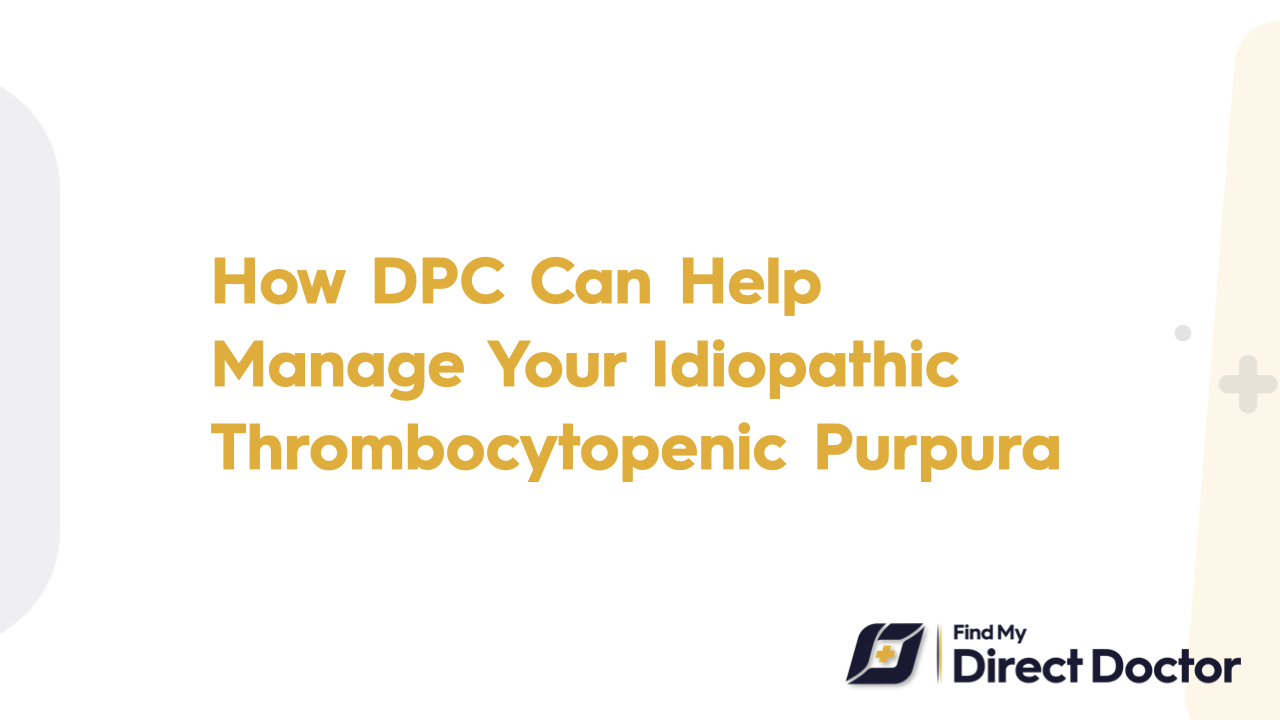



An autoimmune condition called idiopathic thrombocytopenic purpura (ITP) is typified by a low platelet count, which can result in profuse bleeding and bruises. In ITP, platelets—which are crucial for blood clotting—are unintentionally attacked and destroyed by the immune system. ITP can occur suddenly in children or gradually in adults, usually after an infection or other immune system trigger, though the precise etiology is yet unknown.

Depending on how severe the platelet deficit is, ITP symptoms can vary greatly. Easy bruising, the development of tiny red or purple patches on the skin (petechiae), and protracted bleeding from small incisions are typical symptoms. Some people may have severe menstrual cycles, bleeding gums, or nosebleeds. Internal bleeding, which shows up as blood in the stool or urine, can happen in extreme situations. Another common sign of the body's inability to control bleeding is fatigue.
Direct Primary Care (DPC) offers ongoing, easily accessible care that is centered on each patient's unique requirements, creating a supportive atmosphere for managing ITP. Patients can benefit from prompt care plan modifications and routine platelet level monitoring with DPC, both of which are essential for controlling the erratic character of ITP.
DPC doctors spend time educating patients about the illness, making sure they know how important it is to monitor symptoms and spot any warning indications of heavy bleeding. Early intervention is made possible by this proactive strategy, whether it entails coordinating with experts like hematologists or altering treatment. DPC guarantees that individuals with ITP receive the care and assistance required to effectively manage their disease by placing a high priority on patient-centered care.
Consistent access to individualized care is one of DPC's main advantages for ITP patients. DPC provides lengthier, more thorough consultations than traditional healthcare approaches, which may rush sessions. Patients are able to ask questions, talk about their symptoms in depth, and feel secure about their treatment plan because of this. This degree of focus is especially crucial for ITP, as even little symptom changes might signal big alterations in the course of the illness.
Another benefit is the convenience and less stress that DPC offers. Patients can promptly contact their doctor via direct communication channels like phone or email to discuss issues or report new symptoms. This guarantees that any essential treatment modifications are implemented as soon as possible and helps avoid difficulties. Furthermore, by emphasizing holistic treatment, DPC physicians are able to give support that goes beyond simple physical health management by addressing the psychological and emotional effects of having a chronic illness.
At the core of DPC is personalized management, which guarantees that every ITP patient has a care plan customized to meet their unique requirements. A one-size-fits-all strategy is ineffective because ITP varies greatly in severity and response to treatment. DPC doctors collaborate closely with patients to create personalized programs that take into account their treatment choices, lifestyle, and medical history.
In order to lower the risk of bleeding, this individualized therapy may involve modifying immune-modulating treatments or corticosteroid drugs, as well as offering lifestyle advice. DPC providers can react quickly to any changes thanks to routine monitoring and open communication, guaranteeing the best possible care for the disease. DPC improves the quality of life and health outcomes of patients with ITP by empowering them to actively participate in their care through a strong doctor-patient connection.